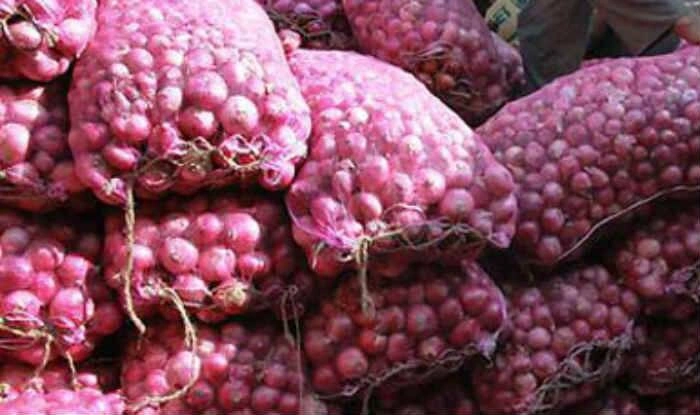Nashik: The Onion Capital of India
Nashik, often dubbed the “Onion Capital of India,” is renowned for its extensive onion
production, contributing significantly to domestic consumption and exports. This region’s unique
climatic conditions, fertile soil, and advanced farming techniques make it an ideal location for
growing high-quality onions. But what exactly makes Nashik onions so special? Let’s dive into the
key highlights.

Why Nashik is Famous for Onions
- Climate and Soil: Nashik’s semi-arid climate and well-drained, loamy soil provide the
perfect environment for growing onions. The region experiences moderate rainfall, which,
combined with its unique soil composition, contributes to producing onions with a distinct
pungency and longer shelf life. - Farming Expertise: Farmers in Nashik have honed their onion cultivation skills over
generations. They employ advanced farming techniques, such as drip irrigation, to ensure
optimal growth and yield. This expertise has positioned Nashik as a leader in onion
production in India. - Quality and Variety: Nashik produces a range of onion varieties, including red, white, and
yellow onions, each known for its specific taste and storage properties. The red onions from
Nashik are particularly famous for their sharp flavor, making them a preferred choice in
both domestic and international markets.
Interesting Facts About Nashik Onions
Export Popularity: Nashik onions are a major export commodity, with significant demand
in countries like Bangladesh, Sri Lanka, Malaysia, and various Middle Eastern nations. The
consistent quality of Nashik onions makes them a preferred choice for importers.
Long Shelf Life: One of the standout features of Nashik onions is their long shelf life. This
makes them ideal for export, as they can withstand long shipping times without spoiling,
ensuring they reach international markets in good condition. Geographical Indication (GI) Tag: The Nashik onion has been awarded the Geographical
Indication (GI) tag, recognizing its unique characteristics linked to the region’s geography.
This tag not only protects the product’s identity but also boosts its marketability on the
global stage.
The Onion Market in Nashik
The onion market in Nashik is one of the largest and most vibrant in India. The Lasalgaon
market, located in Nashik, holds the distinction of being Asia’s largest onion market. Here’s what
you should know:
- Lasalgaon Market: This market serves as a hub for onion trading, attracting buyers and
sellers from across the country. Onions from here are distributed not only within India but
also to international markets. - Price Volatility: The market is known for its price volatility, influenced by factors like
seasonal production, government policies, and export demand. Prices can fluctuate
dramatically, affecting both farmers and traders. - Government Intervention: To stabilize prices and ensure a steady supply in the domestic
market, the Indian government occasionally intervenes by imposing export bans or setting
minimum export prices. These measures have a direct impact on the onion market in
Nashik.
Onion Export from India: Nashik’s Contribution
India is one of the largest onion exporters in the world, and Nashik plays a pivotal role in this.
The region’s onions are highly valued in international markets for their quality and taste.
However, the export scenario is not without its challenges:
- Regulatory Hurdles: The Indian government frequently regulates onion exports to control
domestic prices. These regulations can include export bans, restrictions, or the imposition of
a minimum export price (MEP). Such measures can disrupt the export flow, impacting the
income of Nashik’s farmers. - Global Demand: Despite regulatory challenges, there’s a consistent global demand for
Nashik onions. Countries in Asia, the Middle East, and even Europe rely on Nashik onions for
their culinary needs. - Export Process: Exporting onions from Nashik involves several steps, including quality
checks, obtaining necessary certifications, and ensuring compliance with the importing
country’s standards. This meticulous process ensures that only the best produce reaches
international markets.
Largest Onion Market in Nashik: Lasalgaon
Lasalgaon, a small town in Nashik, is home to Asia’s largest onion market. Here’s why it’s
significant:
- Trading Hub: Lasalgaon is the epicenter of onion trading in India. The market operates
daily, with thousands of tons of onions being traded. Prices set in Lasalgaon often influence
onion prices across the country. - Infrastructure: The market is equipped with modern facilities, including large storage
spaces, auction systems, and transportation networks, making it a well-organized and
efficient trading center. - Farmer Participation: The market sees active participation from local farmers, who bring
their produce to sell at competitive prices. This direct interaction between farmers and
traders helps in better price realization for the growers.
Customer FAQs
Q: What makes Nashik onions different from other onions?
A: Nashik onions are known for their pungency, uniform size, and long shelf life. The unique
climatic conditions and fertile soil of Nashik contribute to these qualities.
Q: Can Nashik onions be stored for a long time?
A: Yes, one of the key features of Nashik onions is their long shelf life, making them suitable for
extended storage and ideal for export.
Q: Why are Nashik onions in high demand internationally?
A: The consistent quality, flavor, and durability of Nashik onions make them a favorite in
international markets, especially in Asia and the Middle East.
Q: How does the Lasalgaon market influence onion prices in India?
A: Lasalgaon, being the largest onion market in Asia, plays a crucial role in setting the benchmark
prices for onions in India. Prices determined here often influence prices across the country.
Q: Are there any export restrictions on Nashik onions?
A: Yes, the Indian government occasionally imposes export restrictions or sets a minimum
export price to stabilize domestic prices, which can affect the export of Nashik onions.